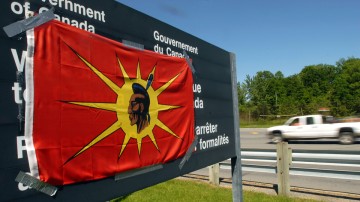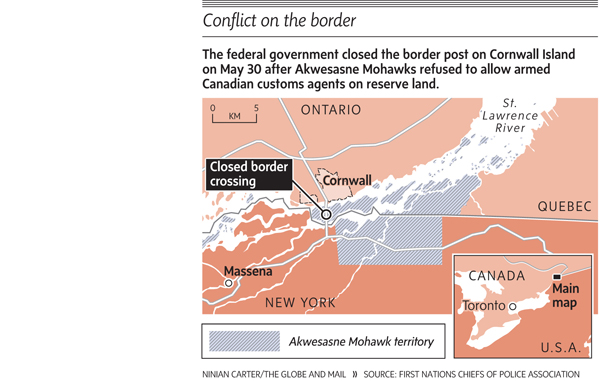The waters around Cornwall Island are
buzzing with motorboats, but these aren't pleasure cruises or the area's
notorious smugglers.
The boats plying this part of the St. Lawrence River these days are
mostly makeshift ferries hauling commuters across the U.S.-Canada border to
the islands and mainland communities of the Akwesasne Reserve.
Long-standing animosity between Mohawks and border guards boiled over May
30, when natives protested the arming of customs agents. The guards fled
their Cornwall Island post, saying they feared violence, and the federal
government shut down the crossing. Cross-border travellers now must take
long detours or navigate the St. Lawrence.
A month into the shutdown, there is little sign of tension between
Mohawks and Cornwallites. If anything, they seem united against Public
Safety Minister Peter Van Loan.
Mohawks filed an application last week asking the Federal Court to order
the minister to reopen the border. They have allies among their neighbours.
“I think the minister could make one call and we'd be moving again, but
he won't do it and I don't know why,” said Dennis Fortier, owner of a
Cornwall trucking company. “He's washed his hands of it.”
With the tourist season under way, hotel and restaurant owners are
bracing for a slow summer. Mohawks have also faced difficulties, with
rerouted funeral processions, postponed medical care and disrupted garbage
pickup.
It's barely 3 p.m. on a work day and Mr. Fortier is sweeping the shop
floor and joking with idle truckers. Business is drying up.
Fearing a supply disruption, a U.S. ethanol plant cut orders for crop
byproducts from Cornwall. Ten loads a week has been reduced to one.
Mr. Fortier's business is down about 20 per cent this month. He's losing
about $5,000 a week in revenue. But he has sympathy for the Mohawk position.
“These are good people who are getting a bum rap in all of this,” Mr.
Fortier said. “But the effect is quite devastating. People are getting
afraid, thinking of contingency plans.”
A few kilometres south, in the middle of the St. Lawrence, Liz Sunday, a
62-year-old Mohawk grandmother, is making the complicated Akwesasne commute.
Instead of driving over the Seaway International Bridge, Ms. Sunday
travels from her Quebec home into U.S. territory at the end of Ransom Road.
Then she hops on a boat for a five-minute ride back into Canada. Without
clearing customs, she hitches a ride to Cornwall General Hospital to visit
her husband, Mitchell, who is recovering from a stroke.
Ms. Sunday embraces the voyage with grace. “I like this, you get to see
people you haven't seen in a long time,” she said. “Maybe they should just
leave [the border] closed.”
A dozen people on the boat say theirs is a principled fight.
“I'm sort of sick of this, but I don't see why the guards should have
guns,” said Niiohontesha Jacobs, 23, U.S.-bound to pick up her two kids from
preschool.
Mohawks warned 18 months ago they would not stand for Canadian customs
agents carrying 9 mm pistols at the only border post on reserve land.
Akwesasne's outgoing Grand Chief Tim Thompson has called Mr. Van Loan a
liar for Ottawa's claim substantive talks were held on the gun issue. A sign
at the border post calls Mr. Van Loan Public Enemy No. 1.
Canadian Border Services Agency officials have met Mohawk leaders, but
the minister has refused to intervene.
“He won't meet with the mayor of Cornwall, for God's sake,” said Chief
Thompson, to be replaced as grand chief by Mike Mitchell next week. Mr.
Mitchell says he “completely” shares Chief Thompson's view on the border.
Mr. Van Loan's office declined interview requests. A CBSA spokesperson
said officials have met “more than 10 times” with Chief Thompson and a
senior bureaucrat has met with Cornwall Mayor Bob Kilger.
At Cornwall City Hall, the tone is less hostile, but Mr. Kilger is
looking past Mr. Van Loan and the CBSA for help.
“I'm starting to think someone like [Indian Affairs Minister] Chuck
Strahl might be of more assistance. Someone a little more attuned to the
history and sensitivities.”
The border post has triggered animosity for decades. Local traffic
accounts for 70 per cent of the 4,000 annual crossings, most by Mohawks.
Mohawks say they have filed several human-rights complaints over guard
mistreatment. One involves a young man subjected to a body-cavity search.
Another is from a woman who says she was forced through an X-ray machine
designed to scan trucks. The cases are unresolved.
“If you are a young Mohawk male driving a decent car, you will be
searched,” Chief Thompson said. “There is systematic harassment and
provocation. My feeling, bottom line, is they're racist. Not all of them,
but there's always some in the bunch to ruin the apples.”
The behaviour of U.S. border guards is exemplary, he said.
But Canadian border guards have their own version of history after two
decades of asking Ottawa to move the border post outside Mohawk territory.
The border post was the first to get bulletproof glass after it was shot
up, according to Customs and Immigration Union president Ron Moran.
Akwesasne's status as a Canada-U.S. smuggling hub adds to the tension. At
the height of the tobacco-smuggling crackdown in the 1990s, guards were
unnerved by red dots trained on them, apparently from laser-sighted weapons.
Mr. Moran says most of the 37 Cornwall Island agents have doctors' notes
saying they cannot go back. And they definitely won't return without their
weapons. “I think it's irreconcilable at this stage,” he said.
The union boss is one of the few defenders of Mr. Van Loan, saying events
took an unpredictable turn. “If you had asked me on the Sunday before it
happened, I wouldn't have thought they could close the office. Nobody paid
enough attention to it to figure out it would get to this.”
The government is reviewing all options, but none of the potential
answers is simple.
Cornwall merchants worry governments will build a new bridge outside the
city to bypass the island.
The border guards and Mohawks suggest Canadian customs be moved to the
U.S. side. Cornwall's mayor believes the move would face insurmountable
legal hurdles.
If the crossing was placed on the Canadian mainland, Akwesasne's Cornwall
Island would become Canadian territory in a customs no-man's land – hardly a
winning formula for the fight against smuggling.

